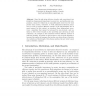14 search results - page 2 / 3 » Oblivious Transfer from Weak Noisy Channels |
STOC
1999
ACM
13 years 9 months ago
1999
ACM
Oblivious polynomial evaluation is a protocol involving two parties, a sender whose input is a polynomial P, and a receiver whose input is a value α. At the end of the protocol t...
CRYPTO
2005
Springer
13 years 10 months ago
2005
Springer
Since bit and string oblivious transfer and commitment, two primitives of paramount importance in secure two- and multi-party computation, cannot be realized in an unconditionally ...
CORR
2006
Springer
13 years 4 months ago
2006
Springer
Abstract. Oblivious transfer (OT) is a primitive of paramount importance in cryptography or, more precisely, two- and multi-party computation due to its universality. Unfortunately...
TCC
2004
Springer
13 years 10 months ago
2004
Springer
Quantum 2-party cryptography differs from its classical counterpart in at least one important way: Given blak-box access to a perfect commitment scheme there exists a secure 1−2...
CORR
2008
Springer
13 years 5 months ago
2008
Springer
We explore the capacity and generalized degrees of freedom of the 2-user Gaussian X channel, i.e. a generalization of the 2-user interference channel where there is an independent...

